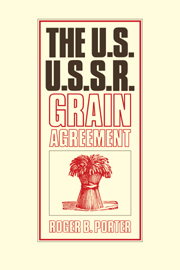Book contents
- Frontmatter
- Contents
- Foreword
- Preface
- List of acronyms used in the text
- 1 Introduction
- 2 U.S.–Soviet grain trade before 1974
- 3 The 1974 experience
- 4 The Russians return
- 5 First steps
- 6 A strategy emerges
- 7 Agreement to seek a long-term arrangement
- 8 Refining the details
- 9 Ebbing leverage: the waiting game
- 10 Evaluations
- 11 Reflections
- Epilogue
- Appendices
- Bibliography
- Index
3 - The 1974 experience
Published online by Cambridge University Press: 05 November 2011
- Frontmatter
- Contents
- Foreword
- Preface
- List of acronyms used in the text
- 1 Introduction
- 2 U.S.–Soviet grain trade before 1974
- 3 The 1974 experience
- 4 The Russians return
- 5 First steps
- 6 A strategy emerges
- 7 Agreement to seek a long-term arrangement
- 8 Refining the details
- 9 Ebbing leverage: the waiting game
- 10 Evaluations
- 11 Reflections
- Epilogue
- Appendices
- Bibliography
- Index
Summary
BACKGROUND
In the wake of their large 1972 purchases, the Soviets harvested a record 222.5 million tons of grain in 1973 and had no need to buy American grain. But in 1974 the Russian crop fell to 195.7 million tons; that autumn the Soviets once again entered the U.S. market, although later in the year than in 1972 and for much smaller quantities.
The summer of 1974 was a tense one in Washington. While the political fate of the president engaged much of the nation's attention, inflation soared to double-digit levels. A potentially tight supply situation for wheat, corn, and soybeans coupled with growing export demands prompted the creation of a cabinet-level Food Committee on June 19, 1974. The president appointed Kenneth Rush, his counsellor for economic policy, as chairman.
Two days later, a Deputies Group was established consisting of representatives from the Departments of the Treasury, State, and Agriculture, OMB, and other appropriate agencies, and chaired by Gary Seevers, a member of the Council of Economic Advisers (CEA). Seevers, an able academic agricultural economist, was widely regarded as both competent and fair. The Deputies Group met first biweekly, then weekly, to monitor the rapidly evolving situation regarding domestic and foreign production, export sales and shipments, domestic consumption, and food aid commitments.
- Type
- Chapter
- Information
- The U.S.-U.S.S.R. Grain Agreement , pp. 21 - 32Publisher: Cambridge University PressPrint publication year: 1984



